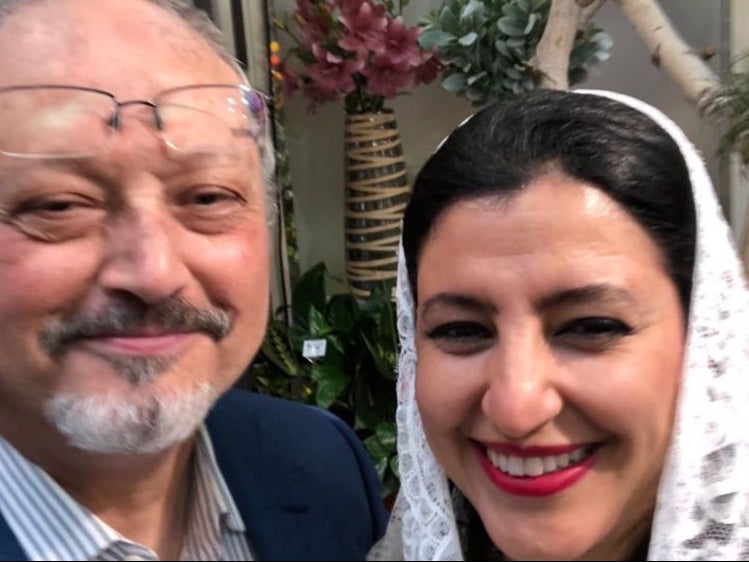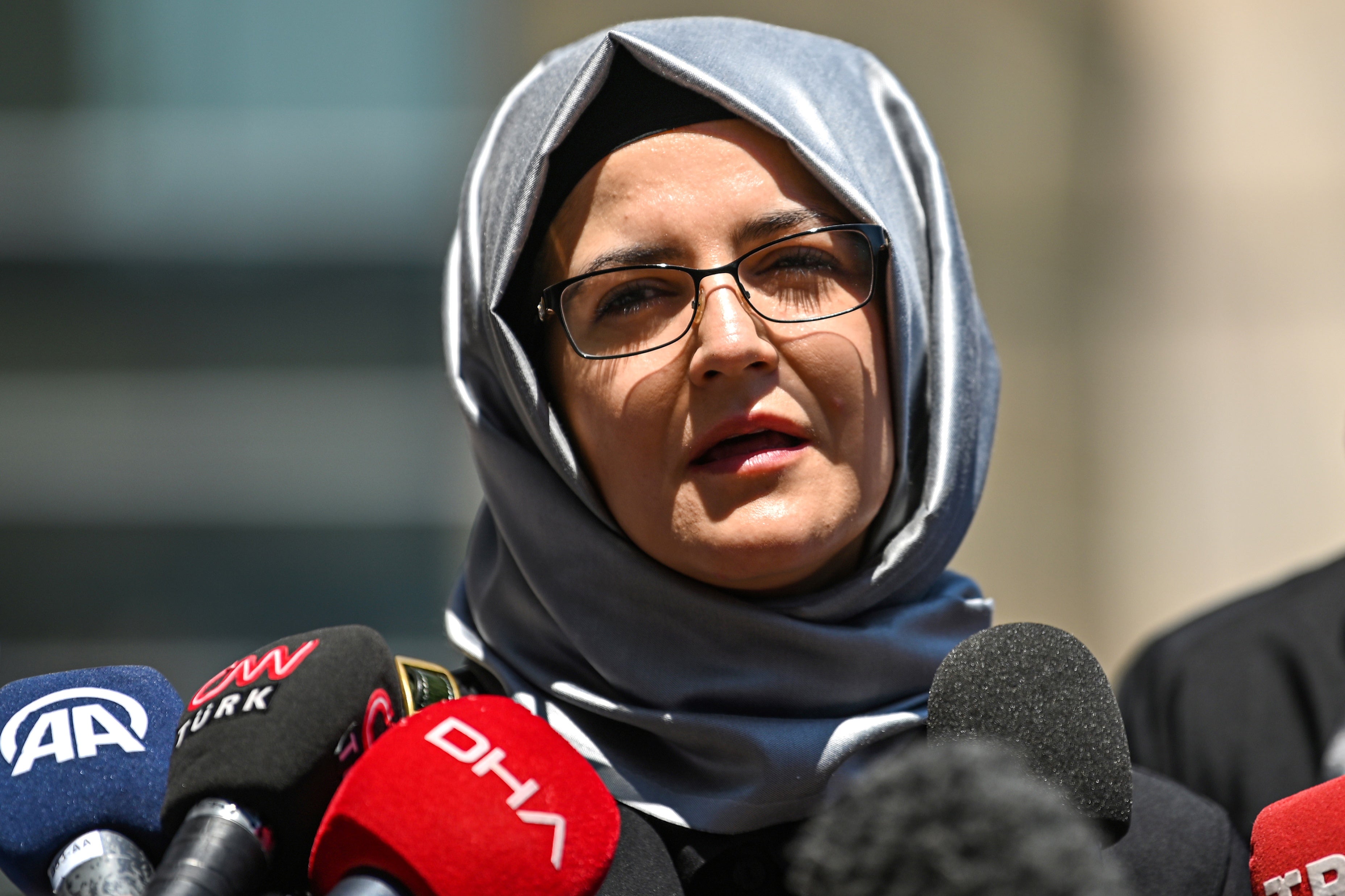Secret wife of Jamal Khashoggi on murder, courage and complicated love life of slain Saudi journalist
Hanan El-Atr had no idea her life was set to change so dramatically, she tells Andrew Buncombe


Your support helps us to tell the story
From reproductive rights to climate change to Big Tech, The Independent is on the ground when the story is developing. Whether it's investigating the financials of Elon Musk's pro-Trump PAC or producing our latest documentary, 'The A Word', which shines a light on the American women fighting for reproductive rights, we know how important it is to parse out the facts from the messaging.
At such a critical moment in US history, we need reporters on the ground. Your donation allows us to keep sending journalists to speak to both sides of the story.
The Independent is trusted by Americans across the entire political spectrum. And unlike many other quality news outlets, we choose not to lock Americans out of our reporting and analysis with paywalls. We believe quality journalism should be available to everyone, paid for by those who can afford it.
Your support makes all the difference.When Hanan El-Atr met Jamal Khashoggi a dozen years ago, she believed the way they connected was uncanny.
The location was a media awards ceremony in Dubai in 2009, and Khashoggi, a celebrated reporter and broadcaster, was picking up yet another honour.
Like many people over the years, El-Atr was struck by Khashoggi’s intelligence and charm. Yet, she believed the connection was so strong he was like her “twin”.
“We have the same vision,” El-Atr tells The Independent. “I remember very well, we talked about the foreign policy of America and we spoke a long time about King Hussein of Jordan and how he dealt with [Egyptian president] Gamal Abdel Nasser.”
She adds: “Anyway, we swapped the telephone numbers. He kept coming to Dubai because his first wife and three of his kids were living [there]. We saw each other whenever he came to Dubai, at least once a month. So, our relationship became close.”
After Khashoggi, 59, was murdered by Saudi agents and his body dismembered inside the nation’s consulate in Istanbul in October 2018, the media rushed to tell the story of Hatice Cengiz, the Turkish woman, 20 years younger than Khashoggi, who was his fiancée. She had travelled with him to the consulate to pick up papers to prove he was divorced from two previous wives in Saudi Arabia, documents that would enable him to marry her.
Then and now Cengiz, 39, who waited in vain outside the consulate for Khashoggi to emerge, considers herself to be Khashoggi’s widowed fiancée. She has helped spearhead a demand for justice and has sued Saudi Arabia’s crown prince, Mohammed Bin Salman (MBS), accused by her and US intelligence of ordering the murder – something MBS stridently denies.
Yet four months prior to his murder, Khashoggi had married El-Atr, 52, in a simple Muslim ceremony in northern Virginia, attended by a couple of witnesses, and officiated by a Muslim imam.
“You will be the happiest bride,” Khashoggi wrote to El-Atr, in a text message first published by Yahoo News’ Conspiracyland podcast.
In another, he said: “I throw myself at you, kiss you and delight you. I take out a watch or a necklace or perfume I bought for you to delight you.”
El-Atr tells The Independent she does not know whether Khashoggi had proposed marriage to Cengiz – “Perhaps yes, perhaps no” – but she is certain she was his wife and is now his widow.
Having spent two years obtaining the certificate proving she married Khashoggi in Alexandria, Virginia, on 2 June 2018, she is now speaking out. She says she feels it is her right to do so, and she is determined to try and continue her late husband’s work to bring reform to the Middle East, and in particular Saudi Arabia.
“My message is that his sacrifice of his life was not for his own benefit, but to help those who are behind bars in Saudi Arabia,” she says, speaking from an undisclosed location in the DC area. “My husband, at the last minute, was crying out for [political prisoner] Essam al-Zamil, and others in jail.”
She adds: “I appreciate the whole world values his sacrifice now, and I want their help, and the journalists’ help, to bring [about] his mission and vision by at least [having them] release the people behind bars in Saudi Arabia.”
In the three years since Khashoggi was murdered, a number of details have emerged about his killing and dismemberment. In February, the Biden administration released a report by the Office of the Director of National Intelligence (ODNI) that assessed the killing had been ordered by MBS.
Despite the controversy, and Saudi Arabia’s denials, there was no real punishment of Riyadh. It then emerged at least four of the dozen-strong Saudi hit team had received paramilitary training in the United States, a contract that would have required the approval of the US State Department.
At the same time, a much richer portrait has also emerged of Khashoggi, whose journalistic career included interviewing Osama Bin Laden in 1979, and who was once a de facto representative of the kingdom. He even had a job in the Saudi Embassy in London.
Not surprisingly, more information has emerged about his personal life, including two ex-wives in Saudi Arabia, the most recent of whom, Alaa Nassif, had served him with divorce papers at the end of 2017. He had four children, two sons and two daughters.
El-Atr, an Egyptian citizen who previously worked as a steward for Emirates Airlines, says while she had known Khashoggi since 2009 and sought to support his work, their relationship became closer when he left Saudi Arabia in the summer of 2017. It appeared he had realised he could not speak and work safely inside the kingdom.
In June 2017, Khashoggi left Saudi Arabia for the United States. El-Atr says she was in London and received a call from a US number. It was Khashoggi.
“I asked ‘are you free’. He said ‘yes’. I said ‘thank God – make use of your freedom’,” she says. “Because I [wanted to] give him a courage to continue his way, because I believed in him.”
In March 2018, says El-Atr, Khashoggi invited her to travel to Virginia to celebrate his birthday. It was at that point the relationship became romantic. A few days later he proposed and bought her two rings.
On 2 June that year, they were married by Anwar Hajjaj, an imam in northern Virginia. They did not seek a civil marriage licence, El-Atr says, because they were trying to keep things low profile.
Regardless, they spent the next three weeks – a period she refers to as their “honeymoon” – doing up the apartment they shared.
This summer, The Washington Post claimed, the phones of both El-Atr and Cengiz were targeted using NSO Group Pegasus spyware.
The Post said a Pegasus user sent texts to her in November 2017 and again in April 2018, and pretended to be her sister. Clicking on the texts would have dowloaded the spyware.
“I believe I’ve been monitored by a lot of people, and my husband as well – I mean a lot of countries,” she says.

The foreign ministries of Saudi Arabia and the UAE did not respond to enquiries. The embassies in Washington DC of both nations also did not reply.
The NSO Group declined to comment further on what it termed “baseless claims”. In a previous statement it said: “Our technology was not associated in any way with the heinous murder of Jamal Khashoggi. We can confirm that our technology was not used to listen, monitor, track, or collect information regarding him or his family members.”
El-Atr says she was at work on 2 October 2018 when she learned Khashoggi had gone missing and was ultimately declared dead.
“When it was confirmed, I couldn’t stand on my feet,” she says. “In fact, one manager from Emirates saw me and [they had to] carry me.”
That was when she learned of Cengiz.
“I don’t know anything about this lady, and I don’t know … maybe she only accompanied my husband to the consulate. But my husband was with me three days before he went to Istanbul, and we were talking though his trip,” she adds.
“I’m not clear who this woman is, what is behind her, or what motivates her,” she said.
El-Atr says Khashoggi had previously had more than one wife at the same time, something that is not uncommon in some Muslim societies.
“I wasn’t too happy. But until now, I don’t know what is the agenda behind her,” she says.
One of Khashoggi’s associates, Kristian Ulrichsen, says he did not know about El-Atr, or Cengiz, but it was perhaps in keeping with the journalist’s discretion about many things.
“I think he was thinking about the fact he may not be able to go back to Saudi for some time, and was thinking about a new life here,” says Ulrichsen, who works as a Middle East fellow at Rice University’s Baker Institute for Public Policy.
He says the last time he saw Khashoggi was March 2018 and he was becoming less optimistic about Saudi’s fortunes under MBS.
He says: “There was very much a sense of regret about the direction things were going in, and a sort of sense of disillusionment, because at the end of the day, he saw himself as a Saudi patriot.”
El-Atr says she too sensed that disappointment. In April 2018, when they became engaged, she says Khashoggi told her: “I might be a curse in your life.”
She says he was also concerned about money and had told her not to quit her job.
She said Khashoggi had told her that a British journalist – either the late Robert Fisk, The Independent’s celebrated Middle East correspondent who died last year, or former Guardian correspondent David Hirst, she does not remember which – told him “to prepare yourself ... to eat burger and chips for a long time”, meaning they would be short of funds.
In last months of his life, Khashoggi had been increasingly depressed about what was happening in the country of his birth.
“Increasingly, he was losing hope, about Saudi Arabia, about the whole Middle East, and his own personal life,” she says.
“[I want to tell people] just how much Jamal suffered for his vision before he died, not just the horrible crime we hear about on 2nd October – my husband died since he left Saudi Arabia. He was in exile by his body, not by his soul. He was always interested in his country.”



Join our commenting forum
Join thought-provoking conversations, follow other Independent readers and see their replies
Comments